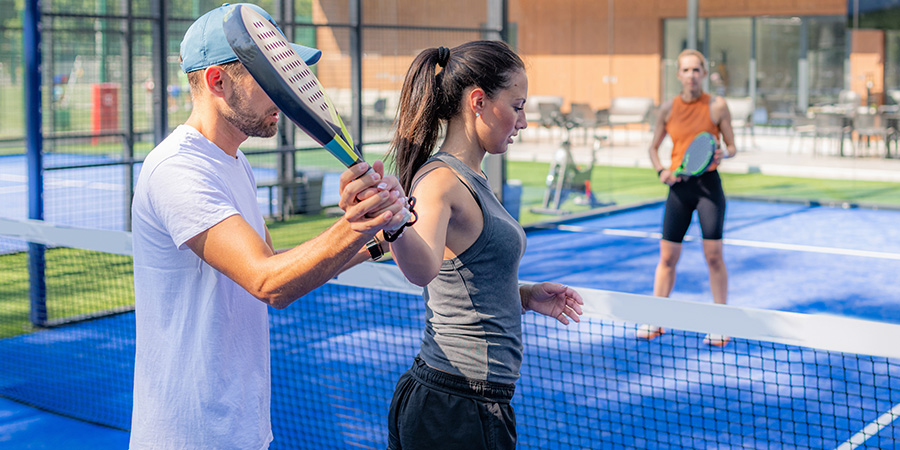Keep the fun in play: Preventing injuries while playing pickleball
November 21, 2023
Pickleball is the fastest growing sport in the United States and is especially popular among people over the age of 55. But while it’s often seen as a lower intensity version of tennis, there are still injury risks involved, with 19,000 pickleball injuries occurring each year.
“Injuries are equally prevalent among men and women; however, the nature of the injuries differs between the sexes” explains Christina Penny, DPT, OMPT, CMTPT, senior physical therapist at Active Life Physical Therapy, an affiliate of GBMC HealthCare. “Females are 3.5x more likely to sustain a fracture type injury because of their lower bone density, while males are 7x more likely to sustain a sprain or strain due to their lack of flexibility.”
“We see lower body injuries occurring slightly more than upper body,” Dr. Penny says. Plantar fasciitis, Achilles tendinosis, and patellar tendonitis are frequently seen in pickleball players. She explains how repetitive actions such as jumping and cutting, coupled with underdeveloped calf muscles and lower fitness levels, can contribute to these specific injuries. Luckily, there are simple ways to minimize your risk of injury while playing.
“Having the right footwear makes a big difference,” Dr. Penny says. “If you’re wearing an old shoe, the heel will wear down and force the calf to work harder, which can lead to Achilles issues.”
For maximum support, Dr. Penny recommends replacing shoes after 60 hours of playing pickleball. She also encourages doing foot strengthening and calf stretching exercises regularly. This can improve balance and coordination, increase the flexibility in your feet and ankles, and reduce the risk of injury due to overuse or strain on the lower legs.
The upper body can also be at risk for injury from playing pickleball.
“These strains, sprains, and fractures usually happen from a slip, trip, fall, or dive while playing,” Dr. Penny explains.
To improve your chances of staying healthy on the court, she adds, be aware of your court position, and learn to fall correctly.
“Don’t backpedal for the ball. Let it go over your head. Communicate with your partner to avoid crashing into each other. Letting someone get the point isn’t worth the fall,” Dr. Penny says. “If you start to fall, get yourself into a ball, put your elbows around your head to protect it, and try to land somewhere plush like your butt, back or thighs.”
If you’re worried about falling, you can schedule a balance screening with a physical therapist, who can help you with balance and flexibility exercises, as well as footwear prescriptions and stretches to maximize your movements and make you a stronger player.
There are two things you can do prior to playing that can help prevent injuries anywhere on the body, Dr. Penny says. The first is to properly warm up before playing to prepare your body for action.
“Your muscles can be compared to a rubber band; if you stretch them too rapidly, they may 'snap' and result in injury. By warming up those muscles for 10 minutes before playing, you’ll be able to make those quick movements with less fear of injury.”
The other prevention strategy happens off the court.
“Strength training will improve your ability to generate force behind your shots. The stronger you are, the quicker you can get to the ball, making you a better player,” she explains. “Two or more days a week should be spent strengthening the major muscle groups like your glutes, back, quads, core, and shoulders.” Strength training provides added benefits of lowering blood pressure, improving bone density, and reducing the risk of injury with falls.
If you have any concerns about injuries while playing pickleball, Dr. Penny encourages you to reach out to a physical therapist.
“We can help prevent injuries, help with recovery, and get you back on the court quicker."


